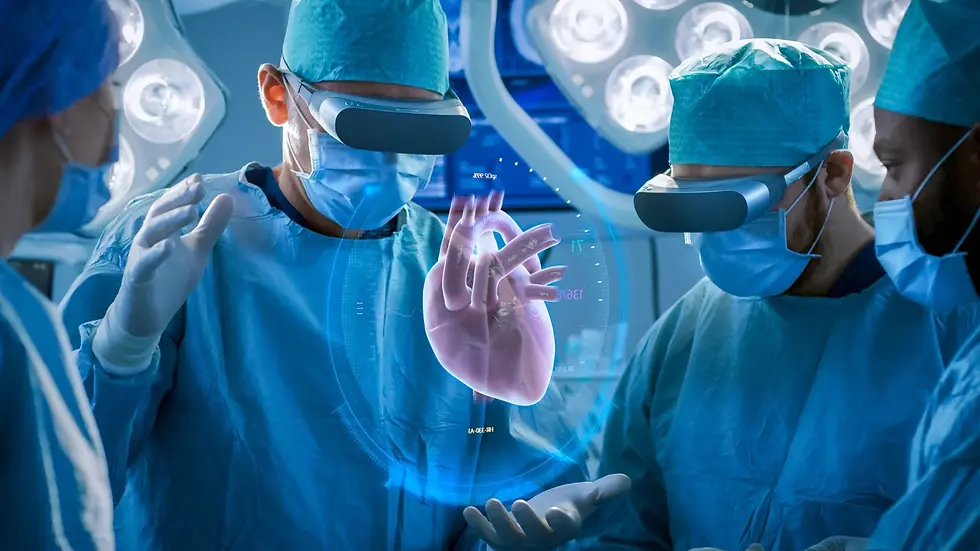AI in Diagnostics: Game-Changer or Overhyped?
- MedWords Editorial

- Jul 26, 2025
- 3 min read
Updated: Jul 29, 2025

Let’s be honest, AI is everywhere right now. From curating our playlists to finishing our sentences, it’s changing how we live. But when it comes to diagnosing illnesses, the conversation hits a whole new level. Can a machine tell if you’ve got pneumonia? Or cancer? Or a rare genetic condition before your doctor even suspects it?
Turns out, it’s already happening. But is this the next frontier of modern medicine, or just another tech buzzword?
So… What Exactly Is AI in Diagnostics?
Artificial Intelligence in diagnostics means using machine learning algorithms to analyze medical data like X-rays, blood tests, genetic sequences, or even patient symptoms, to help detect diseases faster and more accurately.
Think of it like a super-smart assistant for your doctor, scanning through thousands of cases and spotting patterns that even trained professionals might miss.
Some real-world examples:
• Google’s DeepMind can detect over 50 types of eye disease with nearly 95% accuracy.
• AI-powered breast cancer screening tools have matched or even outperformed radiologists.
• In dermatology, AI can scan skin images and flag potential melanomas, often earlier than humans can.
Why It’s a Big Deal
Let’s be real; misdiagnosis is a huge problem. Studies suggest 1 in 10 diagnoses are incorrect, and some life-threatening conditions go undetected until it’s too late.
Here’s where AI shows real promise:
• Speed: AI can analyze imaging or lab results in seconds.
• Consistency: Unlike humans, AI doesn’t get tired or distracted.
• Accessibility: In regions with fewer doctors or specialists, AI tools can help bridge the gap.
• Early detection: By scanning massive datasets, AI can often pick up on subtle signs earlier than human eyes can.
Imagine living in a rural area where there’s no specialist for miles, but your smartphone app flags your symptoms as a warning sign for a serious condition. That’s powerful.
But Wait, It’s Not All Smooth Sailing
For all the excitement, there are still some major challenges.
1. Bias and Inequality
AI is only as smart as the data it learns from. If a diagnostic model is trained mostly on data from white, urban, male populations, it might fail to detect conditions in women, people of color, or other underrepresented groups. That can lead to dangerous disparities in care.
2. Privacy Concerns
AI tools require huge amounts of personal health data, raising questions about who has access to your medical history and how securely it’s stored.
3. No Emotional Intelligence
AI can read a scan, but it can’t hold your hand, understand your anxiety, or compassionately explain complex diagnoses. And that human connection? Still irreplaceable.
4. Overreliance
There’s a real risk of patients (and even doctors) blindly trusting AI decisions without second opinions. That’s dangerous because AI can still make mistakes.
The Human-AI Combo Might Be the Sweet Spot
Experts agree: AI won’t replace doctors, but doctors who use AI might outperform those who don’t.
It’s not about man vs. machine, but man + machine. A skilled doctor with a powerful diagnostic tool? That’s a match made in modern medicine heaven.
Just like how calculators didn’t kill math teachers, AI isn’t here to push doctors out of the room. It’s here to support better decisions, reduce burnout, and catch what might be missed.
Where We’re Headed Next
Some exciting developments to watch:
• AI chatbots triaging patients before they even step into a clinic
• Predictive AI forecasting your risk of diseases before symptoms appear
• AI-powered genetic diagnostics, personalizing your treatments based on your DNA
• Integration into wearable tech, like smartwatches, detecting arrhythmias or sleep apnea in real-time
We’re entering a phase where AI won’t just tell you what’s wrong, it might even prevent things from going wrong in the first place.
Final Thoughts
So, is AI in diagnostics overhyped? Honestly, no, but it’s also not magic. It’s a tool. And like any tool, how we use it matters.
The key lies in blending smart technology with human wisdom. While AI can process data in milliseconds, it can’t replace empathy, intuition, or experience. At least not yet.
In the meantime, the smartest move? Stay informed. Ask questions. Be curious. Because the future of healthcare isn’t just happening to you, you’re a part of it.



Comments